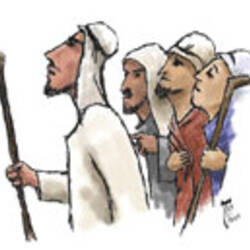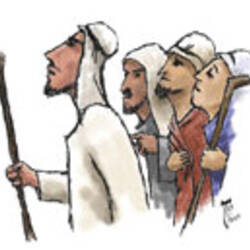Loading...
Click here if you don’t see subscription options
Click here if you don’t see subscription options
Susannah Heschel, daughter of Jewish thinker Abraham Heschel, discusses his father's life and work.
Faith in Focus
Thousands of young volunteers are a bright spot amidst the city's slow recovery.
Columns
When will the United States draw down its troops occupying Iraq? In the political showdown between the president and the Congress over the war in Iraq, attention has focused on legislating a specific timetable for troop withdrawal. This issue will be revisited in September, when debate over war fund
Arts & CultureBooks
In his beautiful and moving Letters to Sam, Daniel Gottlieb, a renowned psychologist who has lived with quadriplegia for 25 years, imparts uncommon wisdom about the lifelong journey of becoming a man.
Current Comment
NEGOTIATING WITH IRAN The meeting of the U.S. ambassador to Iraq with the Iranian ambassador to Iraq in Baghdad on May 28, under the auspices of the Iraqi prime minister, Nuri Kamal al-Maliki, was an encouraging step in the direction urged by the Baker-Hamilton Iraq Study Group. The meetings agenda
Letters
Worth the Reading Many thanks for the recent Of Many Things column (4/30) by Patricia A. Kossmann. I always make it a point to read anything that bears her byline. Thus, this expression of gratitude has been long in coming. She always mentions books that would ordinarily slip by without being notice
Of Many Things
One of nature’s ironies is that when it comes to wildflowers, the semi-arid West, even the desert Southwest in springtime, outdoes the green-forested East. I am told the secret is sunlight. The open forests and high meadows of the Sierra Nevada or Colorado’s San Juan Mountains seem to sp
Faith in Focus
Each year I spend at least a few weeks in the deserts of the Southwest. My favorite places include the high desert canyons of northwest New Mexico, the Great Sonora Desert of Arizona, Death Valley, and the Big Bend area in Texas. Many of my friends in New York City cannot quite understand the attrac
Arts & CultureBooks
A new book traces the development of human rights.
The Word
We usually associate John the Baptist with the Advent season But here in early summer we encounter John once more in order to celebrate his birth on June 24 So important is this solemnity that today it replaces the Twelfth Sunday in Ordinary Time The New Testament does not supply precise informa
Several readers have asked how to locate articles from Americas archives on our new Web site. All articles from 2001 until the present are available, and free, to all who register. You can search our database by author, keyword or title on our advanced search page. You can also search by issue by en
Editorials
As Hispanics in the United States increase in number, they will likely exert more influence on the nation as a whole, and especially on the U.S. Catholic Church. For while Hispanics make up 14.2 percent of the populace, they make up more than a third of its Catholics, a percentage expected to increa
With the publication of the report of the fourth Intergovernmental Panel on Climate Change, it should now be clear to everyone that climate change is one of the most serious ethical issues facing humanity in the 21st century. Even President George W. Bush, after almost a decade of denial, has used t
Faith in Focus
A small but important collection of ingeniously designed yet simple-to-use devices from around the globe is currently on display at the Cooper-Hewitt National Design Museum (part of the Smithsonian Institution) in New York City, where it will be on view until Sept. 23. Organized outdoors in the lush
Arts & CultureBooks
At a recent viewing of the film ldquo Into Great Silence rdquo I was mesmerized as the camera circled the austere perimeter of a new Carthusian novice rsquo s cell and oratory stripped of any comforts or signs of individuality And then there she was pasted to the wall near a bare cross a sma
The Word
Summer is a good time to travel Many of us interrupt the normal flow of life and go elsewhere for a while Travel allows us to meet different people and see different things and we often come away refreshed and renewed At least that is what we hope Today we begin a journey with Jesus and his di
The Good Word
The gospel this week dwells on the theme of hospitality -- that which we offer both to one another and to God and that which God offers to us The intimacy and in a sense extravagance with which the sinful woman welcomes Jesus is sharply contrasted with that of Peter the Pharisee who neither welc











